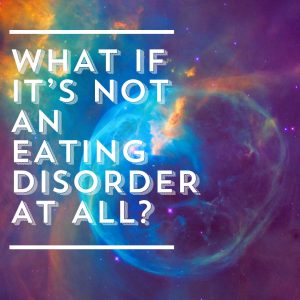
In 2012 I gave my first presentation on the Origins of Dysfunctional Eating Behaviors Model.
If you’ve taken Eating Disorders Boot Camp or heard me speak on eating disorders at all, you know the first column on the chart is “Biology-based,” and I often give the examples of Prader-Willi, PANS, and the woman with an undiagnosed tumor as examples of underlying conditions mistakenly diagnosed as eating disorders. There’s also MTHFR, celiac disease, PCOS… I could go on and on.
In spite of its significant contribution to eating disorder disruption biology is definitely the least addressed of the four origin types. Everyone knows about trauma’s contribution, everyone knows addiction is related, everyone knows that diet culture is a culprit… but when we talk about the physiology of eating disorders, we tend to think of medical complications – outcomes – rather than biological causes.
The consequences for patients are dire because these missed diagnoses (and misdiagnoses) make recovery impossible. Eating disorder treatment will never succeed long-term. The eating symptoms will never subside. Individuals experiencing these difficulties – if they get eating disorder treatment at all – will be labeled as difficult or untreatable as they cycle through program after program without “success.”
I have witnessed a catastrophic disregard for the biological underpinnings of eating disorders in many eating disorder programs. Usually they’re the ones developed and run by a psychologist or therapist who hasn’t made an effort to lean outside their comfort zone, preferred modality, or dissertation topic. They don’t know what they don’t know and they don’t listen when dietitians and nurses alert them, because their egos don’t allow them to admit they don’t know squat about medical conditions affecting eating.
And if you think I’m making abstract generalizations, I’ll tell you about the patients with every symptom of PCOS who were never assessed for it in treatment. Or the program director who – when I suggested that one nurse practitioner was not enough for a 48-bed eating disorder facility – said, “Not everyone here needs medical care.” That was the same person who, after a resident was diagnosed with MTHFR after a savvy nurse/dietitian spotted the symptoms, complained that the test cost too much money.
There are a few doctors – Jen Gaudiani and Michael Lutter come to mind – who encourage us to look for the underlying conditions – MCAS, for example or DNA mutations – whose symptoms mimic – and are misdiagnosed as – eating disorders. But most of the time, talk about eating disorders and genetics centers around the one large gene study. And if you’ve heard me tell the three bears story, you already know why I’m skeptical it will find anything of use. At least for the time being, effective diagnosis, assessment and care focus on the individual person and not on the entire human genome.
Which brings me to citrullinemia. An inborn error of metabolism that most of us have never heard of, citrullinemia is caused by a defect in the citric acid cycle that causes ammonia to build up in the body. Undiagnosed, citrullinemia can cause severe medical and psychiatric problems. The symptoms that develop as an adult – underweight, aversion to carbs and especially sweets, nausea – can look a whole lot like an eating disorder. So far at least two patients with “treatment-resistant” anorexia have been correctly diagnosed with citrullinemia and can now be correctly treated.
It’s possible that someone in your care has this condition, and The Citrin Foundation is on a mission to find them. They’re hosting a 15-minute presentation for eating disorder professionals on March 27th at 11 Central time to explain what to look for. There’s no cost and nowhere to sign up. Just click here to send an email to [email protected] and ask to be added to the list for March 27th. Please forward this email to colleagues and post in any of your groups. (If you received this email from someone else and want to sign up to receive future emails directly, please visit JessicaSetnick.com. Hover for a few seconds and a sign-up form will appear.)
If you’re curious about more of my thoughts on the future of our field and how I think we could/need to improve, listen to my recent interview with Robyn Kievit, a fabulous dietitian and nurse practitioner who specializes in eating disorders. In the podcast, which she named “Fierce, Funny & Forward-thinking,” I shared my dreams for where the field will take us over the next few years.
— Let’s check in —
Recently several of my consultation calls have detoured onto the topic of presentation contracts and negotiations. If you could use some advice in this area, let’s set up a one-on-one session to hammer it out. Click here for pricing and details, or contact Celena to get on my schedule. Of course I’m always available for eating disorders and sticky situations, too. Or if you’re literally sleepless and reading this at night, try The Sleepless Dietitian’s Guide: Advice for the Angst that Keeps You Up at Night – it’s a pdf you can download no matter what time you’re reading this, and it may have the answers to your questions.
—Jessica—
P.S. – here’s this week’s list of upcoming free online eating disorder education:
2/22 The Basics of Working with Eating Disorders: The Dietitian’s Perspective
2/23 Introduction to Neurodivergence and Feeding
2/28 Webinar Panel Discussion: Ask the Experts: Getting Eating Disorder Care as a BIPOC Individual
2/27 Managing Dysregulation in the Virtual Treatment Space
2/28 Understanding Body Trust and Diet Culture
Available any time: What to Say: Discussing Weight and Food in Pediatric Settings***
*** Approved for 2 CME credits so automatically approved for dietitians, too
